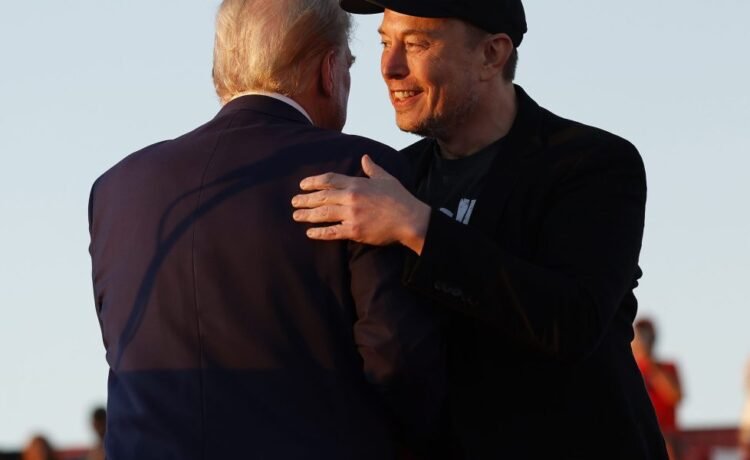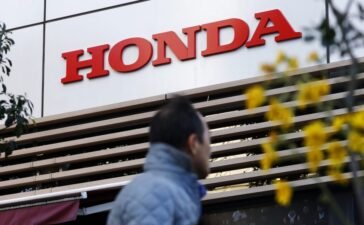Elon Musk has gone where no CEO has gone before, hitting the campaign trail with Donald Trump, leaping with joy on stage with the presidential candidate, echoing inflammatory political rhetoric on social media, and even doling out $1 million daily prizes to registered voters in swing states.
Given Trump’s polarizing persona, you might wonder if the Tesla CEO’s high-profile political partisanship risks turning off some potential car buyers. According to Tesla’s lawyers the answer is not at all.
In the company’s latest 10-Q filing with the SEC, Tesla makes no mention of Trump or any of Musk’s political activities in the section on “risk factors,” which has not been updated since Tesla’s annual report from January. The annual report’s lengthy list of potential risks notes that the company is highly dependent on the services of Musk (the “Technoking”) and that employees may leave or look elsewhere “due to various factors” which may include “any negative publicity related to us.”
But when it comes to the Tesla Technoking’s high-profile move tying his personal brand to MAGA politics, something which has increased dramatically since July when Musk publicly endorsed Trump and announced a Super Pac, the company apparently sees no specific business risk.
Some Tesla investors are not so serene. Dozens of shareholders recently asked Tesla to disclose data about the extent to which Musk’s politics have affected hiring and sales. Some said Musk should either cease campaigning or step down from his post as CEO.
As with much of the things Musk does, his headfirst plunge into politics is challenging established norms, including within the meticulous language of regulatory filings. Political activism isn’t something that would typically show up in reports to the Securities and Exchange Commission, experts on corporate leadership and securities say. But there’s little precedent for Musk, the face and head of a publicly traded company and one of the world’s wealthiest people, showing such deep and committed devotion to one of the world’s most controversial political figures.
“It would be odd at best to list an individual CEO as a risk factor,” said Hillary Sale, director of Cboe U.S. Securities Exchanges, Cboe Futures Exchange, and Cboe SEF and Georgetown University professor. “If a director felt that way about the CEO, they’d have a fiduciary duty to reconsider the CEO.”
The SEC requires firms to disclose all kinds of information, and companies can volunteer additional risks, as long as those risks are material—meaning they would significantly change business operations or regulations. Firms are often forthcoming about their executives’ extracurriculars (see Meta on Mark Zuckerberg’s affinity for extreme sports, or Tesla’s own comments about Musk’s attention to other business ventures). But some issues don’t come up—in 2008, Apple faced questions about whether it had a duty to disclose Steve Jobs’ declining health.
The U.S. Supreme Court ruled earlier this year that investors can’t bring a case over omissions in an SEC filing. The SEC itself could theoretically bring a case, but the agency doesn’t mandate disclosures about political activities, and doing so would likely be criticized as an affront to free speech. (Or in Apple’s case, an invasion of privacy).

Michael Swensen/Getty Images
And since Musk’s political activities are far from a secret, investors aren’t totally in the dark, notes Allan Horwich, a former securities lawyer turned professor emeritus at Northwestern University. The question becomes whether Tesla knows something about how Musk’s political sideshow is affecting share value—and failing to offer that up in response to persistent shareholder questions.
“We know what he’s up to, but do they know what the risks are in him having done this to the company?” Horwich said. His advice to former clients: if there’s any internal debate about whether a risk is material or not, “why don’t you disclose it?”
In a special forum for Tesla shareholders, organized by the company ahead of quarterly earnings earlier this week one investor asked whether the board has made efforts to ensure that Musk’s “political engagement doesn’t detract from Tesla’s core mission and protects shareholder value and brand integrity.” The post garnered 533 up-votes from investors, who in aggregate, own more than 397,000 Tesla shares, according to the company’s tally.
Tesla has not responded to Fortune’s request for comment.
Investors are accustomed to Musk’s antics
Musk has more leeway to run the company as he wants than most other CEOs of publicly traded companies, thanks to investors voting on a pay package that gives him roughly 20% control over Tesla, adds Adam Wowak, a professor of management at Notre Dame University. The voting share combined with his deep ties to the brand give him more power over the board than his peers, who might have to run things like big political donations or endorsements by board members.
It’s also not unusual for Musk to be embroiled in affairs that might cause problems for other public company CEOs — some might argue it’s part of his brand. He famously smoked a joint on the Joe Rogan podcast in 2018. And he has a history of clashing with government agencies that oversee his various businesses, which include space exploration company SpaceX, tunneling company the Boring Co, human implant firm Neuralink, and AI developer X.AI, to name a few.
When the Federal Aviation Administration has gone after SpaceX over rocket launches, Musk has threatened to sue for regulatory overreach. He has said Democrats find his X social network so threatening that a Harris administration would jail and prosecute Musk personally and “shut it down by any means possible.” He decried the “weaponization” of government agencies in response to a privacy probe by the Federal Trade Commission.
Musk’s alliance with Trump raises the stakes. A Trump win could be a boon for Tesla given that Trump has mentioned appointing Musk to be his “secretary of cost-cutting.”
But whichever way the election goes, Musk’s full-throated support for Trump clearly puts Tesla in a spotlight that’s much brighter than what’s faced by CEOs who donate or endorse a political candidate or cause.
“In general, CEOs tend to exercise some caution about deeply engaging in politics, because not all shareholders agree,” notes Sales, the Georgetown professor.
Without speculating on whether such entrenched political ties should be reported to the SEC, “there are definitely reasons to think that this kind of repeated behavior from a public company CEO could be a serious risk to the value of a firm,” said Chris Poliquin, a professor of management at the UCLA Anderson School of Management.
As investors awaited Tesla’s quarterly results this week, the company’s stock was down 14% since Musk’s Trump endorsement in mid-July. The S&P 500, by contrast, had gained 3% during the same period.
Tesla went on to report a modest 2% growth in car sales, but topped Wall Street profit targets thanks to sales of regulatory credits to other carmakers and strength in its energy business. Musk said his “best guess” was that “vehicle growth” in the coming year would increase between 20% and 30%.
Tesla’s stock is now up 7% since Musk’s Trump endorsement.






